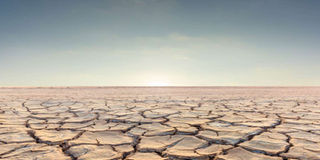Harsh weather linked to rise in mental health problems

Recent reports have further raised concerns about the rising carbon emission mostly from industries and human activities. PHOTO | FOTOSEARCH
Climate change and harsh weather are aggravating the rise of mental health challenges, dengue, malaria and a number of waterborne diseases, according to a report.
The World Health Organisation Health and Climate Change Survey Report, released during a climate change conference in Spain last week, further pointed out that changes in climatic conditions had made it easier for the Aedes mosquito species to transmit dengue virus, increasing the risk of the occurrence of disease since 1950.
In 2019, the report said, the world had experienced a huge increase in dengue cases, compared with the same time last year.
Dr Maria Neira, Department of Environment, Climate Change and Health director at WHO, said the risks could be mitigated if all levels of governments prioritised building health systems resilience to climate change.
The director urged countries to honour their pledges to the Paris Agreement, which requires nations to keep global temperatures below two degrees Celsius by reducing greenhouse gas emission. "Meeting the goals of the Paris Agreement could save about a million lives a year worldwide by 2050 through reductions in air pollution alone,” Dr Neira said.
Recent reports have further raised concerns about the rising carbon emission — mostly from industries and human activities — saying they were responsible for the rising global temperatures, climate disasters such as flood and human migration.
Dr Tedros Ghebreyesus, the WHO Director-General, said countries which participated in the global health and climate assessment identified heat stress, injury or death from extreme weather events, food, water and vector-borne diseases (such as cholera, dengue or malaria) as some of the climate sensitive health risks they were dealing with.
“It is a moral imperative that countries have the resources they need to act against climate change and safeguard health now and in the future,” said Dr Ghebreyesus.
ERRATIC RAINFALL
A study on the state of global climate, released on December 3, indicated that 2019 had been the second or the third warmest year on record, with last the 10 years being the warmest decade ever.
The World Meteorological Organisation (WMO) report also indicated the global mean temperature for January-October periods rose 1.1 degree Celsius above the normal levels.
The warmest ever-recorded year still remains 2016 when drought affected more than three million Kenyans across 23 counties.
WMO Secretary-General Petteri Taalas cautioned that the global temperatures could spiral above three degrees Celsius by the end of the century, resulting in dire consequences on human well-being.
“If we do not take urgent climate action now, then we are heading for a temperature increase,” said the WMO boss. “We are nowhere near on track to meet the Paris Agreement target.”
Mr Taalas observed that one of the main impacts of climate change was more erratic rainfall patterns, which continued to threaten crop yields and food security across many countries.
“Daily, the impacts of climate change play out through extreme and ‘abnormal’ weather. And, once again in 2019, weather and climate related risks hit hard. Heatwaves and floods which used to be ‘once in a century’ events are becoming more regular occurrences,” Mr Taalas told the press at the COP25 conference in Madrid, Spain.
It is estimated more than 10 million people were internally displaced between January and June 2 this year due to climate change related disasters as heavy rains, cyclones and extreme droughts continued to hit developing countries, particularly Africa.



